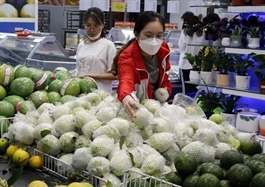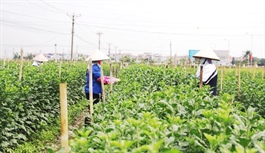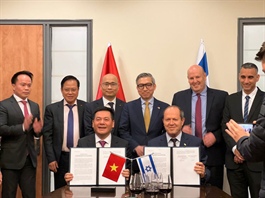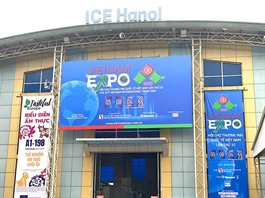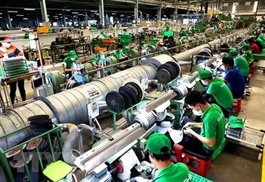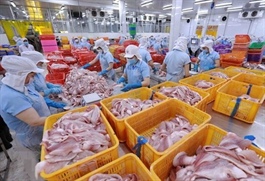Eco-friendly production in lead for aid
Eco-friendly production in lead for aid
The Vietnamese government will offer financial support to agricultural projects in the hope of luring more players into the sector.

Under draft amendments to Decree No.57/2018/ND-CP on incentives for groups investing in agriculture and rural development, the Ministry of Planning and Investment (MPI) has proposed new policies that are more practical and consistent with other laws, such as those on public investment and enterprises.
At last week’s meeting with business associations and provincial departments of agriculture and rural development, Nguyen Thanh Duong, director general of the MPI’s Department of Agricultural Economy, said that the draft of the new decree points out 21 sectors related to the agricultural sector that are supported under the Law on Investment.
Specifically, enterprises with initiatives in agriculture and rural areas are supported by the state budget with a part of loan interest rates from commercial banks for the construction of the project’s infrastructure.
“The level of support capital is equivalent to a loan interest rate of 4 per cent per year, applied for a range of years for particular agricultural projects,” said Duong.
The draft proposes to assist up to 40 per cent of infrastructural construction costs, equivalent to VND10 billion ($435,000) for enterprises with ventures on cattle breeding or slaughtering or up to VND15 billion ($652,000) for aquaculture projects or processing and storage facilities for agricultural products.
“These are key products with some more room for development of the agricultural sector towards sustainable development, with high added value and food safety, aiming that Vietnamese people can enjoy full of clean and high-quality agricultural products,” explained Duong.
“The support in this new decree is the maximum level it can be. However, the specific support level for every case in reality will be decided by the competent authority based on the capacity of the state budget.”
The assistance will prioritise projects with environmentally friendly production processes, low-energy consumption, organic agricultural production, agricultural bio-industry development, and joint projects of production and consumption.
Ha Van Thang, chairman of the Vietnam Agricultural Business Council, proposed some more preferential items like producing biotechnology, microbiological preparations (in addition to veterinary drugs and plant protection products) to deal with environmental problems, and livestock waste, as well as making full use of products’ value.
He also highlighted the decentralisation of authorities in approving investment policies to avoid congestion and delay so that dossiers of businesses “can be approved more quickly and assistance can be delivered easily”.
Nguyen Thi Thu Lien, a representative of the Association of Food Transparency, also asked to loosen the requirements for businesses to approach assistance. “The decree should emphasise clearly the objectives of the incentives. If the assistance of the government is poured into a value chain across various areas, I believe that the efficiency of the state capital would be very high,” Lien said.
Vietnam boasts more than 800,000 enterprises, but only around 15,000 are agricultural enterprises. Major groups continue to dominate in the sector, particularly in high-tech agriculture such as C.P. Vietnam, Japfa Vietnam, Cargill, TH Group, Dabaco Vietnam, Masan, Lavifood, and Doveco. The Vietnamese government has issued a series of incentive policies aimed at promoting private investment in agriculture. In addition to Decree 57, there is Resolution No.53/NQ-CP in 2019 on solutions to encourage and promote enterprises to invest in agriculture effectively, safely, and sustainably.
Deputy Minister of Planning and Investment Tran Duy Dong said, “After five years of implementing Decree 57, besides the results achieved in supporting enterprises to participate in technology transfer, research, and training of human resources, there are still a number of shortcomings that need to be addressed in order to gain more investment into this sector.”
Deputy Minister of Agriculture and Rural Development Phung Duc Tien added, “We need a lot of more production chains in agriculture and developing areas of raw materials associated with processing and markets. Therefore, we must review all issues, and institutions related to agricultural investment, and build some more effective incentive policies.”
Stemming from the coronavirus pandemic and the current Ukraine conflict, the Food and Agriculture Organization of the United Nations has warned that more than one billion people will go hungry, but Vietnam still has an abundant food source. “From that awareness, Vietnamese authorities will accommodate resources and give incentives to the development of the agriculture sector,” said Tien.
In the January-March 20 period, foreign investment into the agriculture sector is estimated at $1.8 million, making up only 3.3 per cent of the total investment in Vietnam. Accumulatively as of March 20, foreign investment in this sector is $3.86 billion, capturing 0.87 per cent only of the accumulated total investment into Vietnam.








